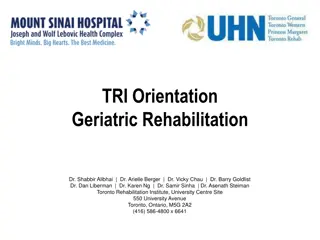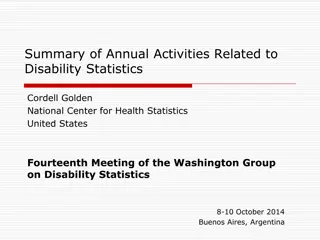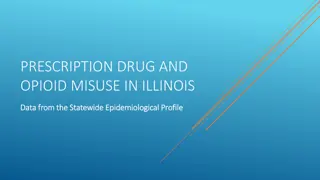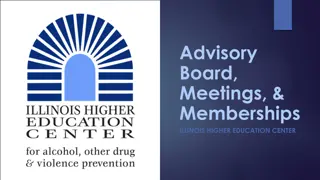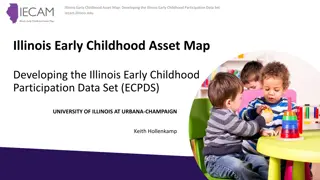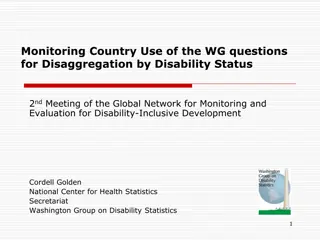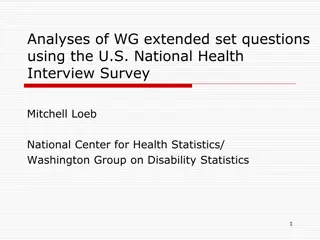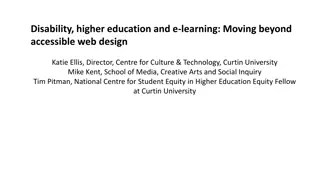Disability Advisory Committee's Impact on Illinois Higher Education
The Disability Advisory Committee (DAC) at Northern Illinois University, led by Angela Szczepanik-Sanchez, has been actively working towards creating a more inclusive and supportive environment for students with disabilities since 2019. Their efforts have focused on strategic planning, efficiency improvements, student retention, and promoting accessibility on college campuses to align with the goal of a Thriving Illinois. The committee emphasizes the importance of clear pathways for student support, coordination of transitions, increased resources for campus inclusivity, tailored support for individual needs, addressing funding loss issues, and ensuring a seamless pathway to graduation.
Download Presentation

Please find below an Image/Link to download the presentation.
The content on the website is provided AS IS for your information and personal use only. It may not be sold, licensed, or shared on other websites without obtaining consent from the author. Download presentation by click this link. If you encounter any issues during the download, it is possible that the publisher has removed the file from their server.
E N D
Presentation Transcript
IBHE Board Meeting June 14, 2023 Northern Illinois University Disability Advisory Committee (DAC) Presentation: A Thriving Illinois Angela Szczepanik-Sanchez, M.Ed., M.S.Ed. Director, Student Disability Services Governors State University DAC Representative to report to the IBHE Board
Current DAC Membership: Nicole Mathews Chicago State University April Jackson Eastern Illinois University Tammie Keney Illinois State University Doug Lawson Northeastern Illinois University Berthine Blanc Southern Illinois University Edwardsville Lisa Caringer Southern Illinois University Carbondale Chrisa Potthast-Leezer University of Illinois at Springfield Sophia Hamilton University of Illinois at Chicago Kim Collins University of Illinois at Urbana-Champaign Angela LaFrance Western Illinois University Greg Moorehead DePaul University Angelia Martinez Lewis University Jennifer Miller McKendree University Carrie Pierson Millikin University Rebecca Ramirez-Malagon Harper College Kristin Elliott Kishwaukee College Kim Eddings Lincoln Land Community College Kim Korando Illinois Student Assistance Commission Angela Szczepanik-Sanchez Governors State University
What has the DAC been Working On and How has the DAC been Involved On their Campuses in alignment with A Thriving Illinois? Abrief overview of our work thus far since 2019: 1. As a Committee, we have contributed to the Board s Strategic Planning initiative based on issues Committee members identified in the categories of affordability, accessibility and equity, attainment, sustainability and growth for disability service providers and students at Illinois colleges and universities. 2.We continue to work to address areas that present challenges to our respective divisional efficiency and capacity. 3.We continue to strive for the successful retention and completion of our students with disabilities through accessible and advertised services and support systems.
Some of our primary insights as a committee include: a. Clearer pathways for students to get the kind of support they need, such as vocational rehabilitation services. Students should be informed and made aware of these services in high school to prepare and plan for post secondary education. b. Coordination of student transitions and evaluation practices (high school to college) to determine what information students are given prior to applying for college such as services and accommodations that are available in post secondary education. c. More resources to create an inclusive and accessible campus. d. More resources to support the unique circumstances at each campus. Each student is an individual and some campuses do not have the resources to secure more individualized requests based upon a student s need determined in an interactive intake process with the student. e. Students losing funding due to conditions they cannot control such as mental health and chronic illnesses along with life obligations. f. Make course requirements and pathway to graduation as seamless as possible.
Some of our primary insights as a committee continued: g. Updated disability codes for Diagnostic Data Collection and Reporting to accurately align with the latest edition of the DSM and current terminology. h. A crafted template for best practices in establishing transparent and accessible Essential Abilities and Technical Standards for degree paths, programs of study and professional schools which lack them. i. An increase in the base number of staff personnel in offices that serve students with disabilities and a policy and position to address digital accessibility on college campuses. j. A public facing online repository for updates from the DAC committee, shared templates and documents which can be accessed by Disability Services Providers/Practitioners at other colleges and universities in the State of Illinois. k. Official correspondence materials for the purposes of issuing announcements on updated best practices, resolutions, and statements of support on behalf of the IBHE Disability Advisory Committee.
Pursuant to the IBHE Strategic Plan:A Thriving Illinois and specifically the priority areas of Affordability, Accessibility and Equity, Attainment, Sustainability and Growth the Disability Services Advisory Committee (DAC) of IBHE puts forth the following recommendations: 1.Expand Summer Bridge programs to students with disabilities to have the option to live on campus and have access to college readiness and transition programming, remedial support though tutoring and mentoring, and access to mental health support and services 2.Student Success and Accountability -How does our role as Disability Service Providers have the capacity to influence campus wide trainings in alignment with Diversity, Equity, Inclusion, and Belonging 3.Adult students of lower SES cannot always afford or have access to evaluations to secure documentation to receive accommodations As most universities and colleges do not have the staff to provide evaluations, can universities provide financial assistance and/or support with covering cost of evaluations? 4.Disability Service Providers Present at IEP meetings for transition to higher education 5.Admissions/Advising/Students with Disabilities/1stGeneration/High Risk/Underrepresented 6. Functional elements of each program within a university or college would clearly publicize the functional abilities/skills necessary to complete a specific program. This is important so that students who have barriers to their education are informed up front of what the requirements are of a program so they do not find out later in their program after accruing a large amount of debt that they are no longer able to meet the requirements and then they cannot complete their program/degree.
DAC recommendations continued: 7.Develop and Implement appropriate medical leave policies for students with mental health, chronic and episodic conditions 8.Develop and Implement a framework of equity and inclusion and creating a cultural environment of belonging 9. Develop and Implement a framework for providing accessible online content 10.Require a base number of staff to serve students with disabilities. The number of students with disabilities across the State of Illinois continues to grow. 11. Affordability and availability of diagnostic testing for learning, language, cognitive, and mental health conditions (including students over 18 years old). Not all students with disabilities are evaluated and diagnosed during their K-12 education. 12. Deeper collaboration with Illinois Vocational Rehabilitation Services 13.Deeper collaboration with secondary schools to support transition of students with disabilities from high school to college 14.Disability as Diversity & Disability Inclusivity 15. Autism and Learning Differences Training and individualized and group support services. Not all Illinois campuses offer specific programing focused on specialized academic support, social, and daily living skill sets
We look forward to continued work with IBHE to address disability services concerns in higher education. Thank you for the opportunity to present to you today.










